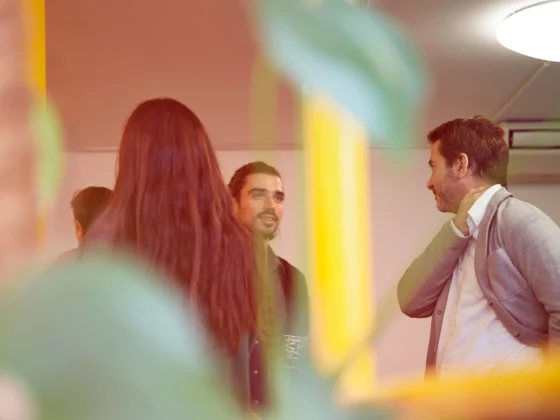Written by Lidia Vijga, CO-Founder at DeckLinks
If you’re debating whether to book that flight to Vancouver next spring, here are some numbers that might help. Web Summit Vancouver 2025 drew over 15,000 attendees, 600 investors, and 750 startups to the waterfront Convention Centre. And those aren’t just networking statistics – projections show the event will generate CA $172M in direct spending and CA $279M in total economic impact across BC over the next 3 years.
I know that you can find plenty of conferences promising inspiration, deal flow, and great coffee. But, in my experience, when a region already leads North America in high-tech job growth and then invites the Web Summit brand to throw its first full-scale North-American event there, you get a mash-up of ambition and opportunity that’s hard to replicate.
British Columbia also maintains a 30-year track record of commercializing world-class technologies. Put simply, if you care about product-market fit and global distribution, Vancouver offers you a living laboratory where climate tech collides with fintech, healthtech rubs shoulders with gaming, and new immigrant founders stand a realistic chance of acceleration without sacrificing identity.
Table of Contents
- Agriprix : Where Farm Meets Algorithm
- TheAfterEve: Relationship Transition Guidance
- IcePanel: Collaborative Architecture Diagrams
- 3DentAI: Dental Diagnostics from Your Smartphone
- Abili-Tech Systems: AI That Listens With Its Eyes
- Prompta AI: Making Change Manageable
- BuildCheck AI: Spotting Construction Plan Errors Before They Break Ground
- EyecareX: Eye care – Anytime, Anywhere.
- Trustful Clinical Budgeting: Getting Clinical Trials Off Excel
- Goose Insurance: A One Stop Shop for All Your Insurance Needs
- Goparity Canada: Crowdlending for Projects That Make an Impact
- Reeltro: Video-First Professional Networking
- Curie: Shop in 3D
- ComplyPilot: Next-Gen Compliance for Financial Institutions
- APIHS: Next-Gen Protective Coatings
- Econsciousness: Transform Waste Into Resources
- Airble: Private Aviation, Unlocked
- LitLife: AI Co-Pilot for Personal Trainers
- Eagle Eyes: AI That Spots What Search Teams Miss
- CircularPlace: A Platform for Professional Reuse
- Conscious Collective: Meaningful Corporate Gifting
- Hydram Research: Turning Industrial Waste Heat Into Usable Energy
- Produce8: Getting Your Lost Work Hours Back
- Goverly AI: Unlocking Government Contract
- CX Hero: Human-Grade Digital Avatars in 73 Languages
- Homebox: Household Bill Management for People Who Despise Hold Music
- Emerging Themes You’re Likely to Notice
Agriprix : Where Farm Meets Algorithm
Do farmers dislike software dashboards? Apparently not! Agriprix allows growers to provide inventory quantities and receive AI-generated price recommendations. Since margins in farming are razor thin, that few-hour head start means the difference between selling strawberries fresh or sending them to jam producers at a discount.
This vision of modernizing agriculture while respecting its traditions runs deep in Agriprix’s leadership DNA. CEO Enes Kaan Ozturk’s emphasis on “bridging traditional farming with modern solutions” isn’t just corporate speak – it reflects a nuanced understanding that farmers aren’t looking to abandon centuries of agricultural wisdom, but rather to augment it with smart technology. The platform doesn’t replace a grower’s intuition about market timing, instead it enhances it with data-driven insights that can make the difference between profit and loss.

The financial reality behind this technology-meets-tradition approach is what CFO Altug Ozaslan calls “financial sustainability and innovation going hand in hand.” In an industry where a single weather event can wipe out months of investment, Agriprix’s model of providing immediate, actionable pricing intelligence represents a fundamentally different approach to agricultural risk management. Rather than selling farmers expensive software licenses they might not fully utilize, the platform creates value that directly translates to revenue optimization – making the technology pay for itself through better market decisions.
Perhaps most intriguingly, CTO Samet Genc’s promise to provide “data from the future” hints at Agriprix’s predictive capabilities extending beyond simple price recommendations. By analyzing market trends, weather patterns, and consumer demand signals, the platform doesn’t just tell farmers what their strawberries are worth today- it helps them understand what they might be worth tomorrow, next week, or next season. This forward-looking approach transforms farming from a reactive business into a strategic one, where growers can make planting and harvesting decisions based on anticipated market conditions rather than historical guesswork.
TheAfterEve: Relationship Transition Guidance
Divorce and separation are universal human experiences, yet navigating them often feels isolating and overwhelming—even for those with significant resources and support systems. TheAfterEve was born from this exact realization when founder and CEO Dana Buckley, despite having a successful career at Indeed.com, excellent legal representation, and a PhD in political science, found herself crying over boiling pasta water during her own difficult divorce in 2021. That moment of feeling “utterly overwhelmed” and “deeply alone” crystallized a market gap: there was no single, comprehensive resource to help people navigate relationship transitions with both practical guidance and emotional support.
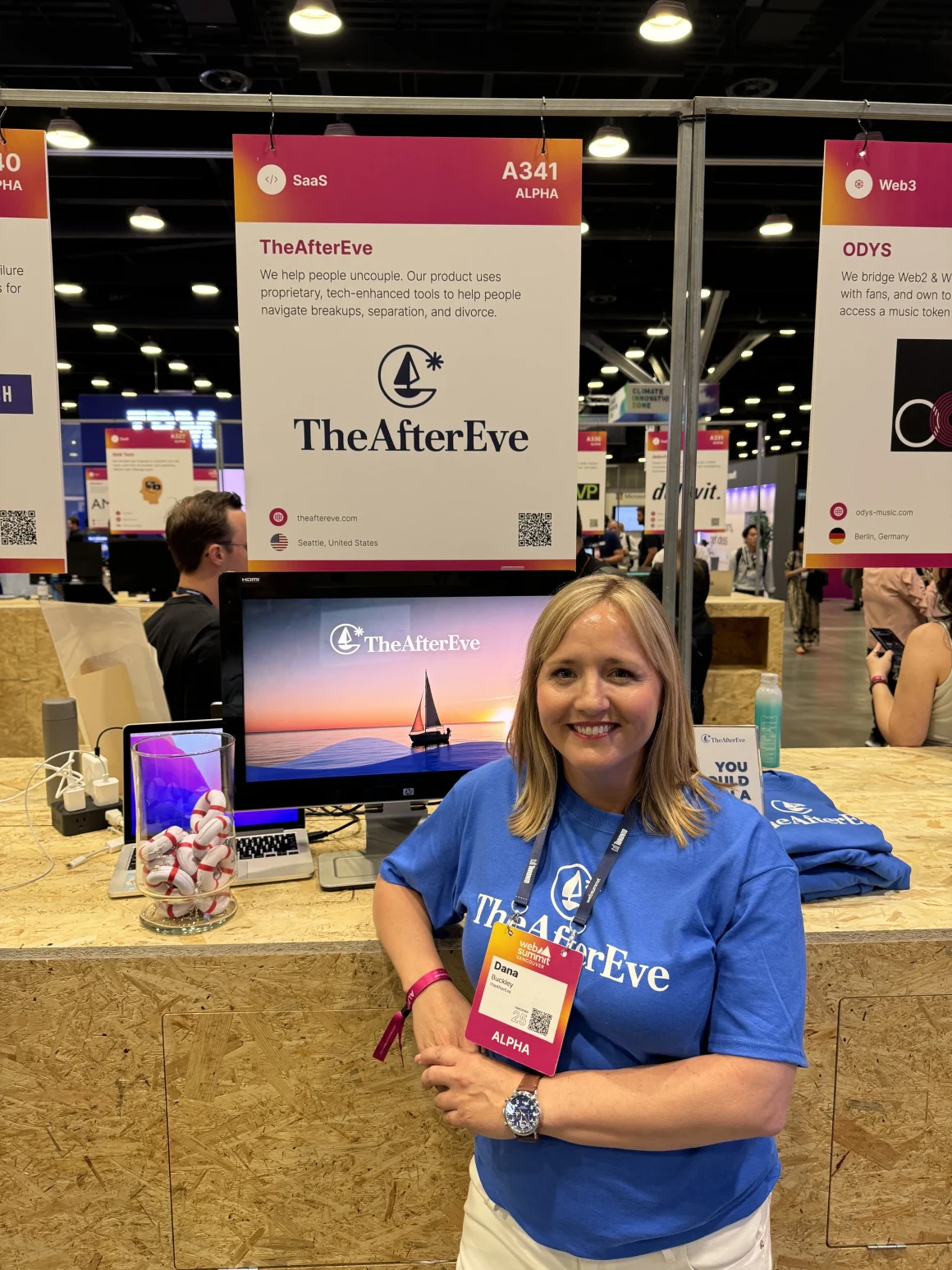
What makes TheAfterEve unique is its foundation in lived experience rather than theoretical expertise. Buckley’s journey from that overwhelming March evening to bootstrapping the company with her own post-divorce savings reflects the platform’s core philosophy—that people should be “the captain of their own ship and the architect of their own life.” The company doesn’t just offer expert-backed resources for emotional wellbeing and financial decisions; it provides the kind of comprehensive, compassionate guidance that Buckley wished she’d had access to during her darkest moments.
TheAfterEve’s approach recognizes that relationship transitions aren’t just legal or financial events—they’re deeply personal transformations that require both practical tools and emotional support. By combining content, tools, and services specifically designed for people navigating romantic relationship changes, the platform serves as both roadmap and companion for one of life’s most challenging journeys, helping users remember that “brighter days lie ahead.”
IcePanel: Collaborative Architecture Diagrams
IcePanel is a modeling and diagramming tool that helps software dev teams communicate and plan technical changes. You can create interactive maps of your software systems, zoom in and out of different detail levels, and link your diagrams directly to your code. It’s basically turning those static docs we all hate updating into something that actually feels alive and useful.

The tool uses the C4 model, so you can zoom from big-picture system context all the way down to detailed component views. What’s really helpful is that as your code changes, IcePanel automatically updates the diagrams for you. No more outdated architecture docs that everyone ignores because they’re three months behind reality.
With Y Combinator backing them, IcePanel’s got some early street cred in the dev tools space. They’ve nailed the balance between letting teams collaborate and keeping things from turning into a complete mess with their granular access controls. Users are calling it “Figma for backend blueprints,” which honestly captures the vibe pretty well – it makes complex system architecture feel way more approachable and less intimidating. They’re currently looking for software developers to join their team, which makes sense given how much traction they’re getting.
3DentAI: Dental Diagnostics from Your Smartphone
3DentAI is shaking up preventive dental care with AI-powered at-home diagnostics that actually make sense. Based in Vancouver, they’ve built a platform that lets you monitor your oral health using a compact smart camera and real-time AI analysis, basically bringing the dentist’s expertise to your bathroom mirror.
The idea is simple but powerful: catch problems earlier, get better outcomes, and make dental care way smarter than the current “wait until it hurts” approach. Their AI can instantly pre-screen dental images, and what’s really impressive is that their model was developed directly with experienced dental professionals, so it’s not just some generic AI trying to figure out teeth.
The platform goes beyond just taking pictures though. They’ve built intuitive annotation tools specifically for dentists to help train and continuously improve their diagnostic models, plus a full telemedicine module that makes it easy for patients and dentists to connect.
The team behind it is a solid mix of engineers, dentists, and AI researchers who are all focused on the same goal: making dental health more accessible, proactive, and data-driven instead of reactive and expensive.
Abili-Tech Systems: AI That Listens With Its Eyes
Abili-Tech tackles a barrier that, in my experience, still stumps a surprising number of public service providers: seamless communication between sign-language users and hearing communities. Their flagship mobile app translates sign language to speech or text – and back again – while running mostly on-device.
Their multi-dialect support can recognize regional ASL variations and adjust pronunciation for the voice output. The startup also aligns with UN Sustainable Development Goals 4 (quality education) and 10 (reduced inequalities), making it attractive to impact investors increasingly required to report ESG metrics.
Prompta AI: Making Change Manageable
Change management has always been more art than science – until Prompta AI brought data-driven precision to one of business’s most human challenges. Since 2020, the company has been proving that AI-enabled change management reduces costs by an average of 25% while delivering better outcomes. Their approach recognizes that successful organizational change requires both cutting-edge technology and deep human understanding.

What sets Prompta AI apart is making the invisible visible. While traditional change management relies on intuition and periodic surveys, Prompta AI provides real-time insights into workforce sentiment and organizational dynamics. This allows change leaders to spot resistance before it becomes rebellion and identify adoption opportunities before they’re missed—shifting from reactive to predictive change management.
The platform excels in the most challenging scenarios: digital transformations, M&A integrations, and culture shifts. Through user-friendly readiness assessments and progress tracking, Prompta AI enables leaders to maximize productivity while ensuring widespread adoption, mitigate resistance before it derails progress, and minimize the chaos that typically accompanies major organizational change.
This hybrid methodology – pairing data science with human connection – has turned transformation from a high-risk gamble into a manageable, measurable process that scales to each organization’s unique needs.
BuildCheck AI: Spotting Construction Plan Errors Before They Break Ground
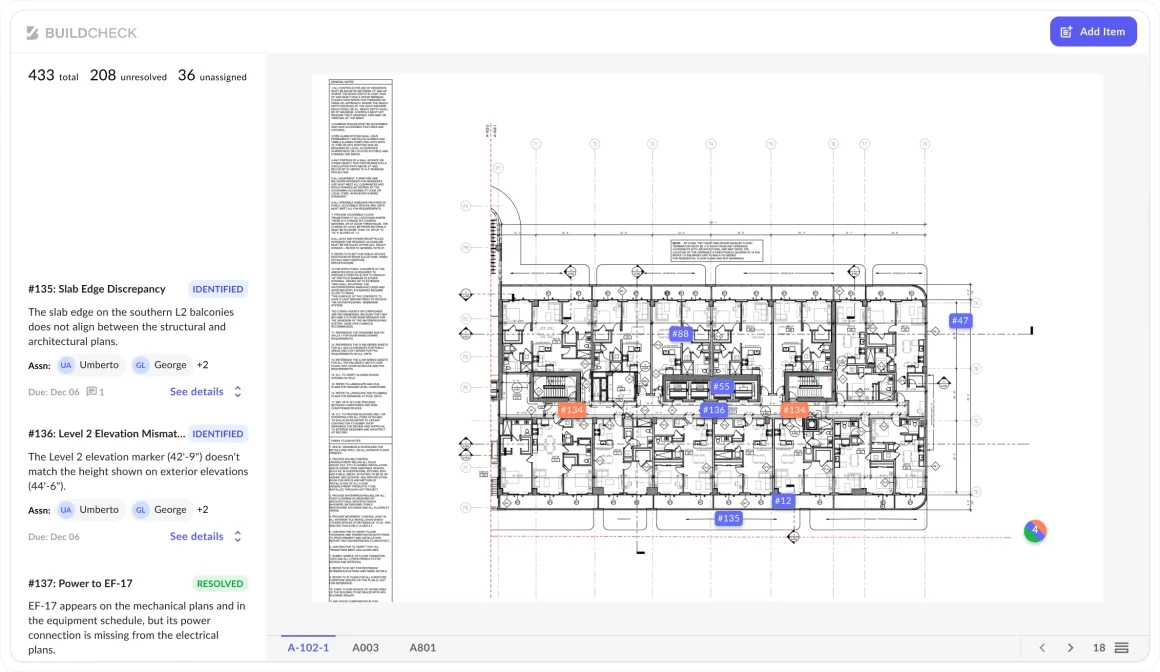
This California-based team emerged from Stanford’s computer-vision lab to build an intelligent plan-review platform that performs over 200 automated checks across all disciplines and design documentation—from floor-plans and elevations to details, schedules and specifications.
For Alexander Michalatos, whose background spans the construction industry from bottom to top, the comprehensive technology represents a solution to a problem he’s wrestled with throughout his career. The son of a Greek-Canadian residential contractor, he grew up on job sites from houses to hospitals before earning a mechanical engineering degree at UBC, where he graduated top of his class. His career progression took him from building design to construction management at Honeywell Building Solutions and later EllisDon as a general contractor, followed by an MBA at Stanford while working in real estate development both domestically and abroad.
This diverse experience ultimately led him to co-found BUILDCHECK, driven by a persistent question: why can’t designs be perfect?
EyecareX: Eye care – Anytime, Anywhere.
EyecareX runs eye exams with nothing but a smartphone. Their software guides users through a self-administered scan and then leverages AI to flag markers of preventable diseases such as diabetic retinopathy. Licensed optometrists review any anomalies, closing the loop between automation and professional oversight.

Many critics thought that tele-optometry would always require bulky peripherals or in-clinic imaging. EyeCareX challenges that assumption by pushing the cost of hardware down to a consumer-friendly range, creating a solution that benefits everyone in the eye care ecosystem.
For patients, the platform delivers accessible eye care directly to their homes through smartphone-guided tests—eliminating travel time, reducing barriers to screening, and making preventive care available regardless of location or mobility constraints.
For healthcare providers, EyecareX enhances clinical efficiency by handling initial screenings remotely, reducing appointment backlogs, and surfacing actionable diagnostic data—allowing practitioners to concentrate their expertise where it’s most valuable.
Trustful Clinical Budgeting: Getting Clinical Trials Off Excel
Clinical trial financial management remains surprisingly antiquated in an otherwise high-tech industry. Despite the billions invested in medical research annually, 82% of the market still relies on manual Excel tracking – an approach that leads to 20% budget overruns, project delays, and extended study timelines. Trustful Clinical Budgeting was built to solve this fundamental disconnect between the operational complexity of clinical trials and the financial precision they demand.
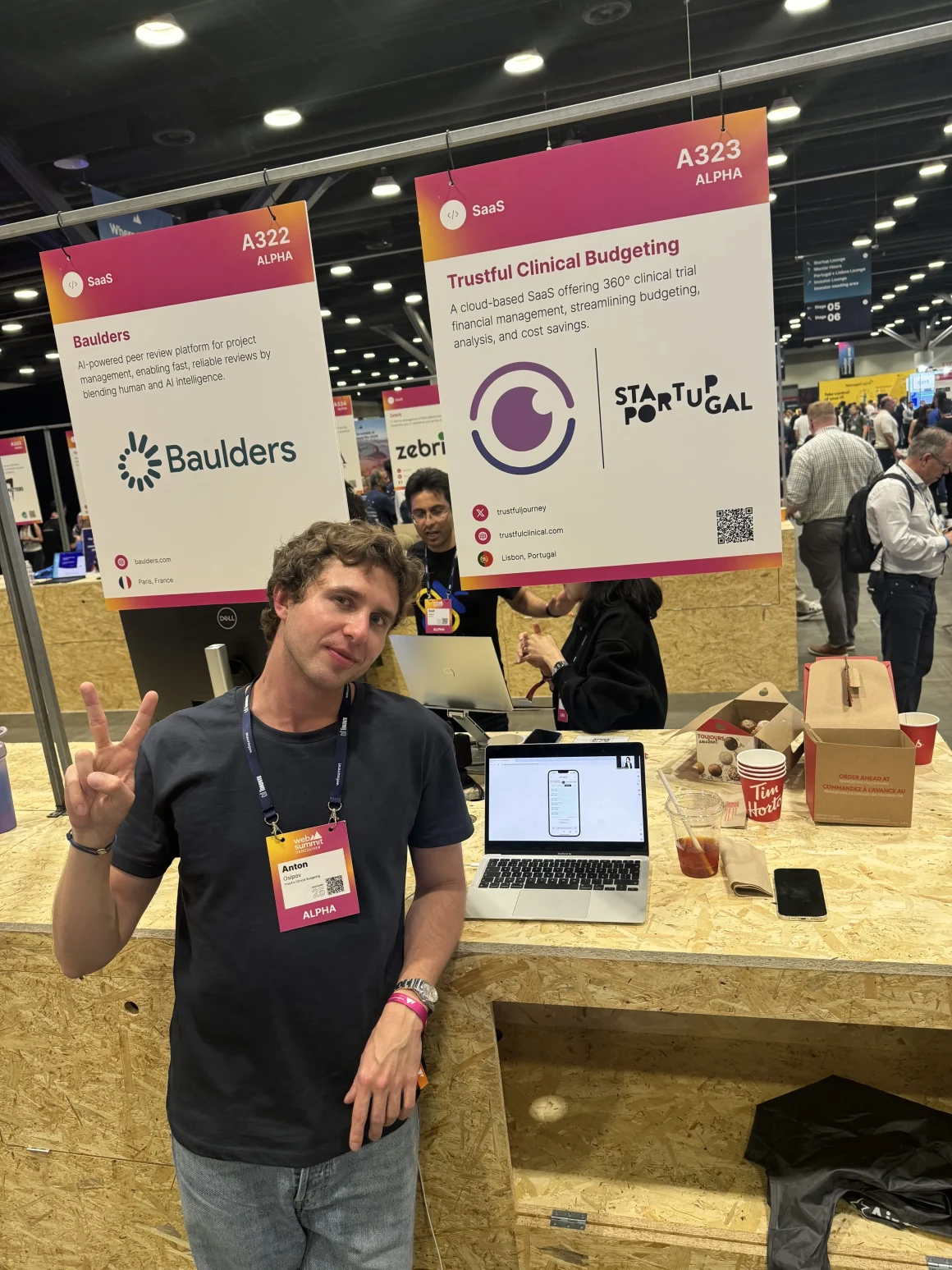
The platform serves as a comprehensive bridge between operations and finances through three integrated modules. The Client Module manages contracts and tracks the critical gaps between planned and actual work, ensuring milestone-based billing stays on track. The RFP Module automates budget estimation by allowing users to input key trial parameters – countries, sites, monitoring frequency – and generates accurate budgets using customizable templates. Meanwhile, the Vendor Module helps manage the complex web of contracts with vendors and freelancers across multiple countries, ensuring all costs are properly categorized and tracked.
What sets Trustful Clinical Budgeting apart is its focus on being a “simple budgeting tool for the operational team” rather than just another financial software. By providing automatic budget calculations, expenditure pattern analysis, and cost-saving opportunity identification, the platform empowers research teams to make informed financial decisions in real-time. This operational-finance integration transforms clinical trial budgeting from a reactive, Excel-based headache into a proactive, data-driven advantage that keeps studies on time and on budget.
Goose Insurance: A One Stop Shop for All Your Insurance Needs
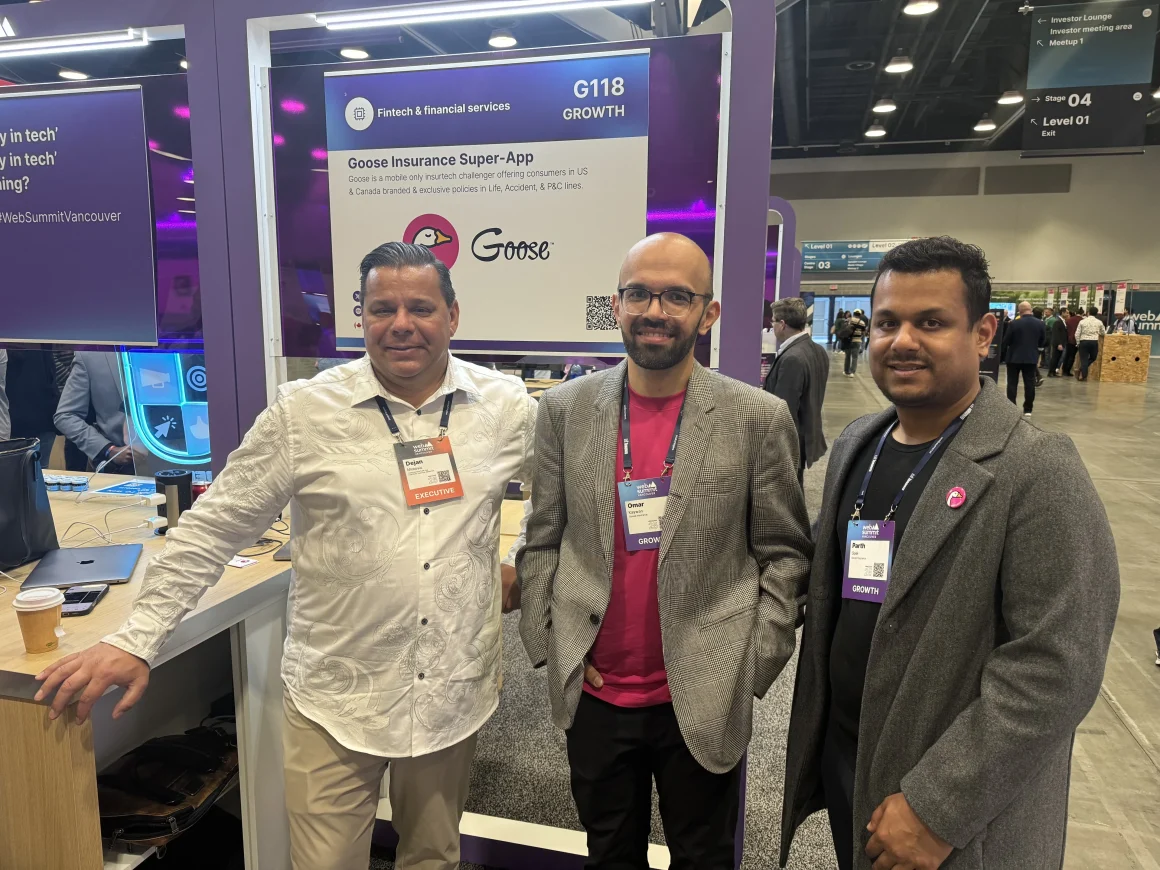
FinTech North will buzz with plenty of neobanks and credit-builder apps, but you’ll notice Goose – or SmartBunny in the United States – because their cheerful bunny mascot bounces across the screen as if to say, “Insurance can be fun too.”
Goose now serves 750,000 customers, and churn sits dramatically below industry averages because the interface simplifies renewals into a tap rather than a dreaded email thread. The company’s strategy of rebranding for U.S. users shows a nuanced understanding of cultural positioning: Americans respond better to playful animals than to Canada’s avian metaphor. If you want a lesson in user-experience friction-slashing, study Goose’s onboarding flow end to end!
Goparity Canada: Crowdlending for Projects That Make an Impact
Goparity lets Canadians invest in sustainability projects with as little as CA $20, tracking both financial returns and environmental impact like carbon emission reductions. The platform focuses on storytelling as much as numbers, showing investors exactly what their money is funding and what kind of change it’s creating in the world.
The company has managed to get licensed as an Exempt Market Dealer across several Canadian provinces, giving it regulatory approval that many fintech startups struggle to obtain. This licensing allows Goparity to operate legally while balancing the need to tell compelling impact stories with the strict disclosure requirements that securities regulators demand.
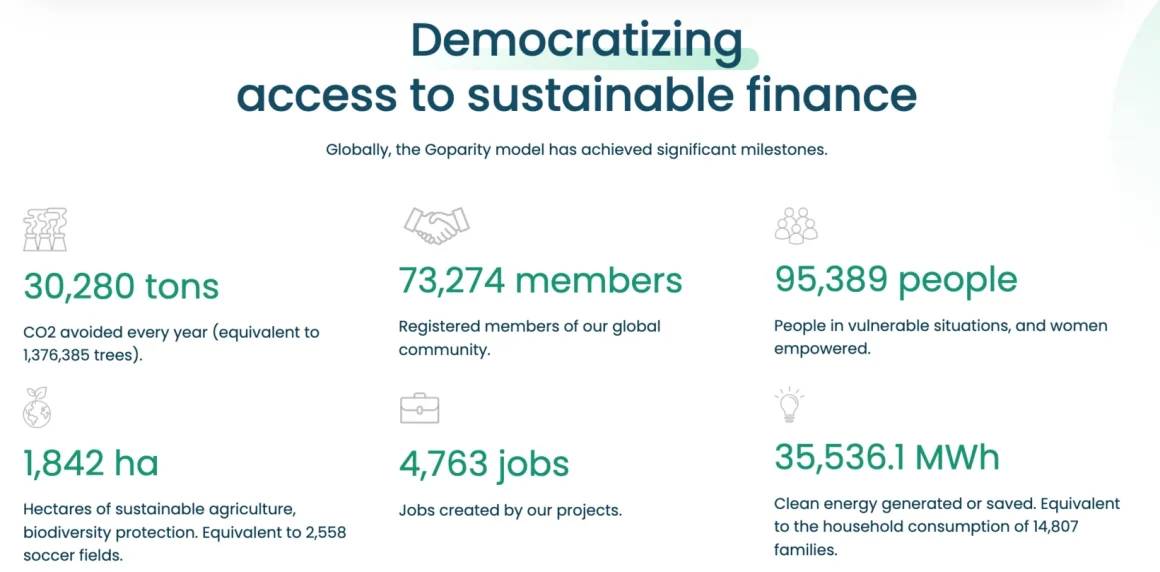
What makes this particularly interesting is how this startup is democratizing sustainable finance – turning what used to be large-scale institutional investing into something ordinary people can participate in with small amounts of money. The platform shows how crowdfunding can drive real environmental and social change by connecting individual investors directly with projects that are making a measurable difference.
Reeltro: Video-First Professional Networking
The disconnect is obvious: while professionals spend hours scrolling through engaging video content on social platforms, they’re still stuck presenting themselves through outdated text resumes and static LinkedIn profiles. Reeltro believes this mismatch is holding back the next generation of professionals, so the platform reimagines professional networking by bringing the engaging, authentic format of TikTok to career development, allowing users to “be seen, be heard, be hired” through short-form professional videos rather than generic job descriptions and text-heavy profiles.

Reeltro’s mobile-first approach addresses a core problem in modern hiring: authentic representation. While traditional platforms rely on polished text and carefully curated achievements, Reeltro encourages users to “showcase your authentic self for the best first impression” through video resumes and customizable profiles. This format allows professionals to demonstrate the skills that “pay bills”—from technical expertise to creative prowess—in ways that static resumes simply cannot capture.
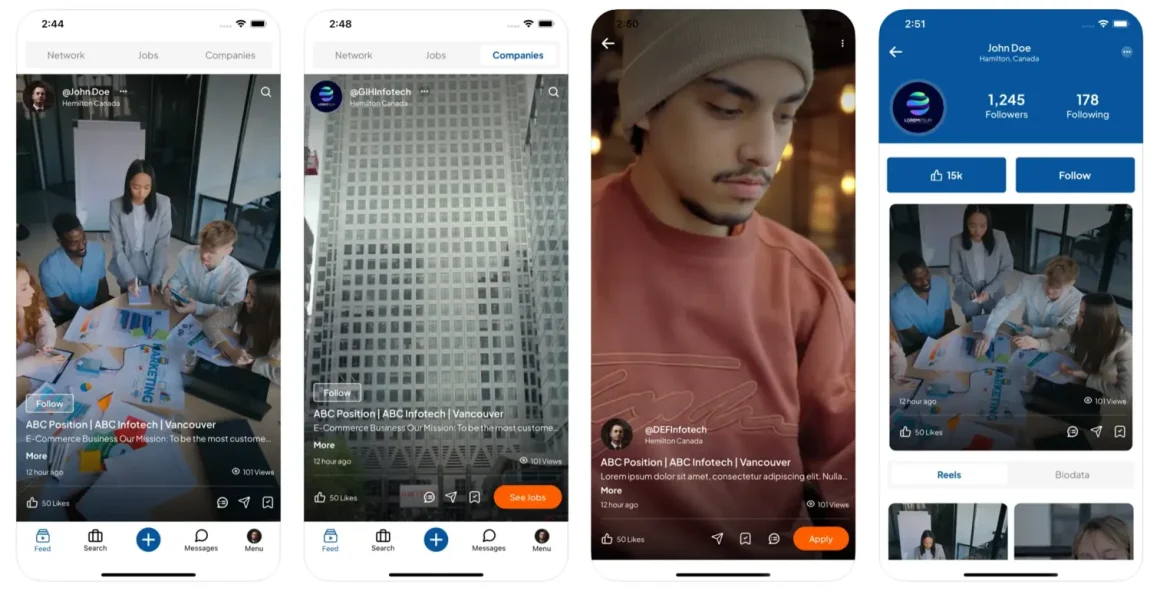
The platform’s innovation extends beyond individual profiles to reimagine the entire hiring ecosystem. Video job postings allow employers to showcase company culture and values dynamically, while giving job seekers genuine insight into potential roles and workplace environments. This two-way transparency helps create better matches and reduces hiring friction. By prioritizing diversity, equity, and inclusion in its design, Reeltro isn’t just disrupting professional networking—it’s working to ensure that talent recognition isn’t limited by traditional formatting constraints or unconscious bias embedded in text-based screening processes.
Curie: Shop in 3D
Curie is a startup that creates incredibly detailed 3D versions of products for online shopping, focusing on making e-commerce feel less flat and more interactive. The company addresses a fundamental problem with online shopping: you can’t really understand what you’re buying from a few photos, especially for items where texture, shape, and feel matter. Using what they call “deterministic agents” to avoid the unreliable outputs that often come from AI systems, Curie builds accurate 3D digital twins of products without requiring any physical scanning of the actual items.
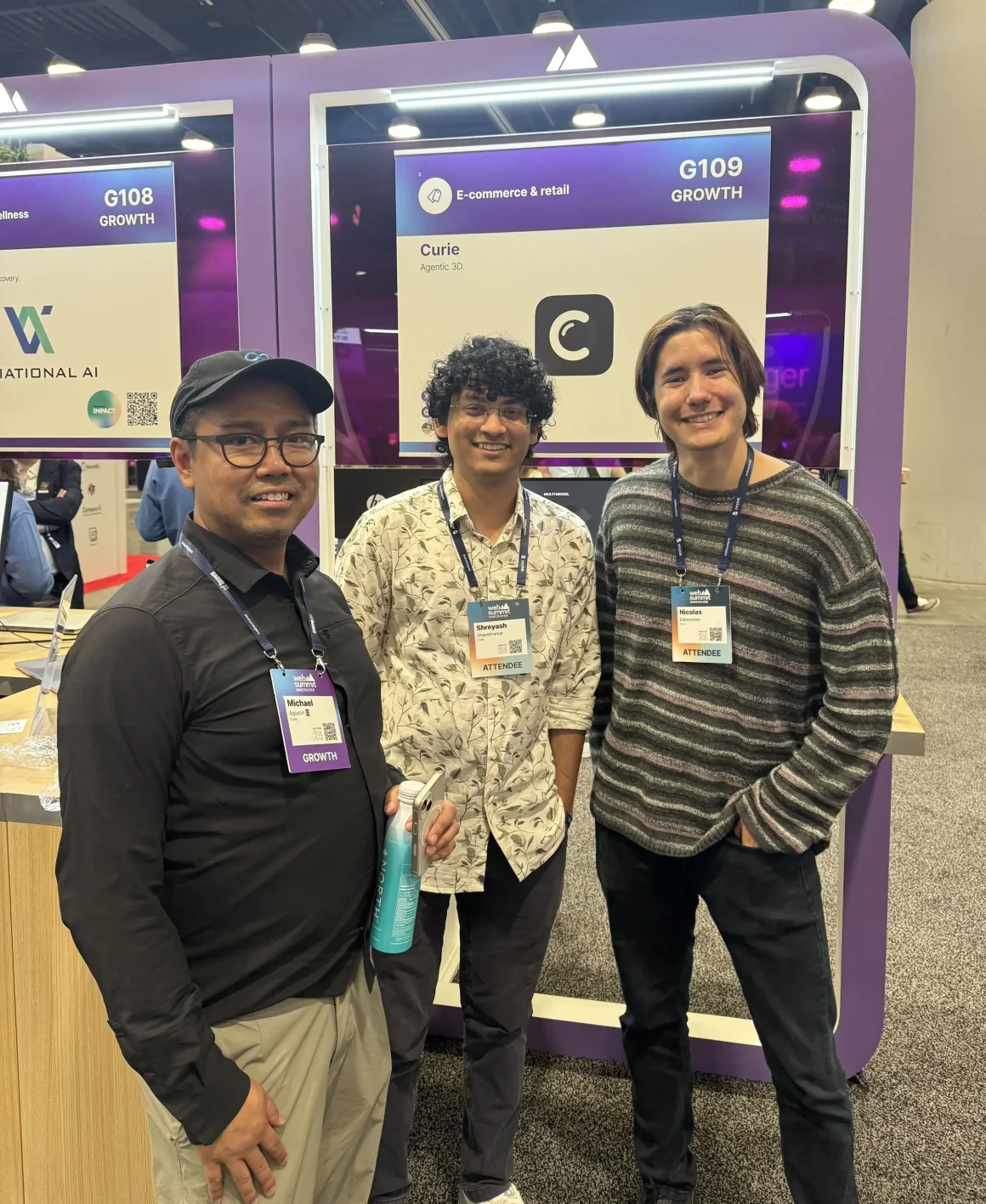
The technology works particularly well for products like sneakers, where buyers want to understand the shape, texture, and construction before making a purchase. Instead of just looking at flat images, shoppers can explore every detail of a product in three dimensions, getting a much better sense of what they’re actually buying.
Beyond just the visual technology, Curie operates as an e-commerce platform that brings together buying options from various partner merchants. They provide data-driven insights, product comparisons, and detailed descriptions alongside their immersive 3D catalog. The company’s goal is to bridge the gap between online and in-store shopping experiences, giving customers the confidence to make purchases by letting them virtually handle products before they arrive. For retailers, this could mean fewer returns and more satisfied customers who know exactly what they’re getting.
ComplyPilot: Next-Gen Compliance for Financial Institutions
ComplyPilot uses AI to help banks and financial institutions handle regulatory compliance more efficiently. The company tackles a problem that costs financial institutions enormous amounts of time and money: staying compliant with complex federal regulations like Reg Z, HMDA, and BSA requires teams of experts to manually review everything from marketing materials to social media posts. What used to take days or weeks of careful analysis, ComplyPilot can now do in hours, automatically flagging potential violations and providing specific guidance on how to fix them.
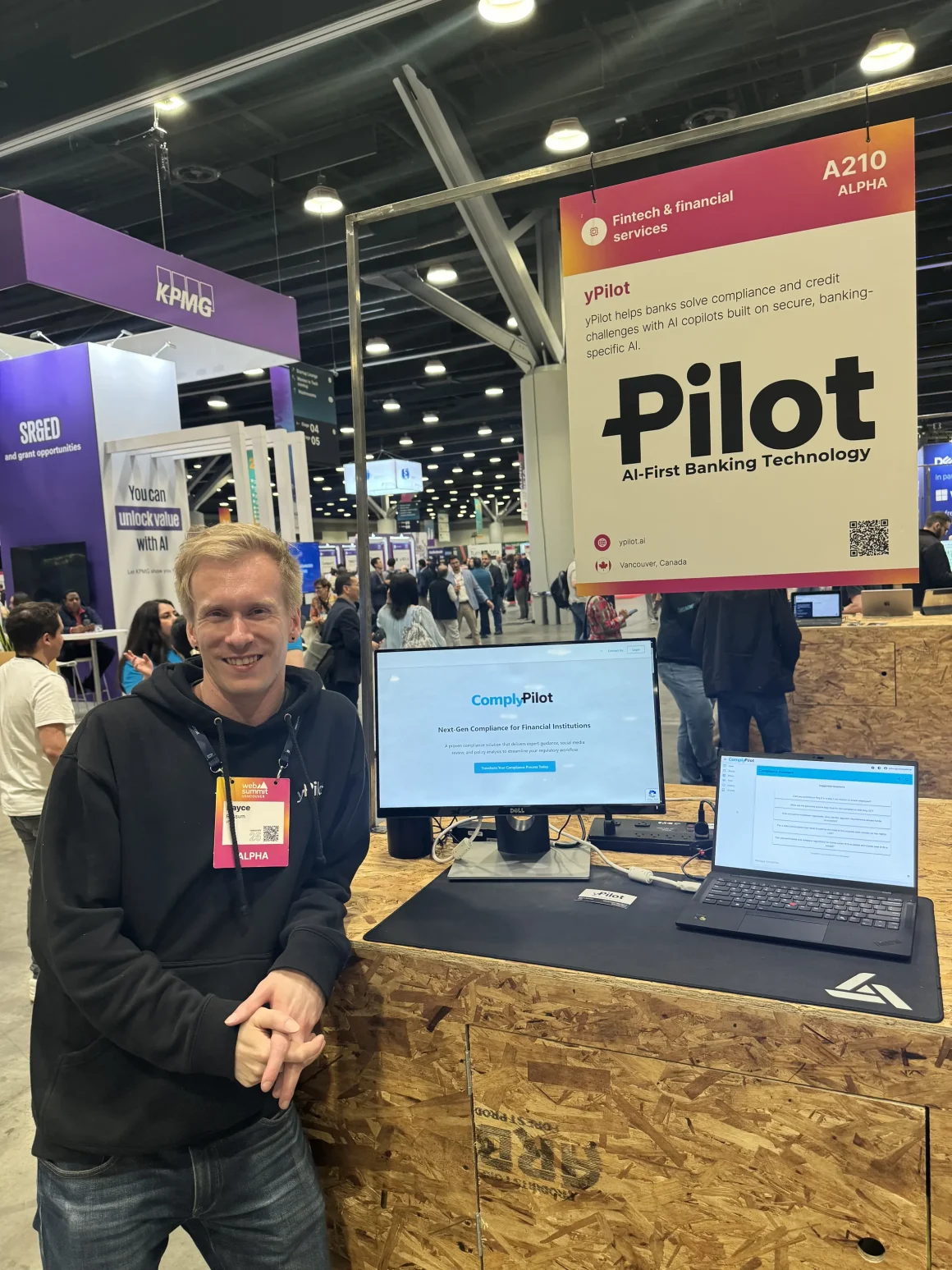
The platform works on several fronts simultaneously. It can review social media posts before they go live, catching content that might violate regulations while suggesting compliant alternatives that still sound like the company’s voice. It also analyzes internal policies to identify gaps between what companies are doing and what current regulations actually require. The system includes a smart document search that can quickly find relevant regulatory information from complex financial rules, plus collaboration tools that help compliance teams stay consistent across different departments.
Instead of just helping companies react to compliance issues after they arise, ComplyPilot is designed to spot potential problems early. The platform integrates with existing workflows without disrupting how teams already work, but adds an extra layer of automated checking that catches regulatory risks before they become violations. For financial institutions, this means less time spent on manual compliance reviews, fewer regulatory violations, and better documentation when examiners come calling. The system essentially creates a single source of truth for compliance knowledge that the entire organization can use.
APIHS: Next-Gen Protective Coatings
While most coating companies focus on incremental improvements to existing products, APIHS is fundamentally reimagining what protective coatings can achieve. The research and development company pushes the boundaries of material science to create next-generation formulations that deliver superior durability, efficiency, and environmental sustainability. Their approach goes beyond traditional coating applications—they’re developing ecological liquid solutions that are simultaneously thermal, waterproof, fireproof, and environmentally protective.

What sets APIHS apart is their strategic focus on solving real-world challenges through advanced material science. Their liquid thermal insulation solutions directly address CO2 reduction goals by providing energy gains for buildings and industrial equipment, while their optimized formulations enhance both material efficiency and application processes. This isn’t just about better coatings—it’s about creating environmental solutions that help companies reduce their carbon footprint while improving operational performance.
APIHS thrives on strategic collaboration with industry experts and research institutions, recognizing that breakthrough innovations require collective expertise. Their rigorous approach combines advanced research into novel compounds with performance optimization and sustainable alternatives, ensuring each product undergoes extensive testing and refinement. By balancing cutting-edge technology with competitive pricing through reduced raw material and transport costs, APIHS is positioning itself to meet evolving market demands while making advanced coating solutions accessible to a broader range of industries.
Econsciousness: Transform Waste Into Resources
A Mexican startup Econsciousness has found a clever way to tackle environmental problems while making money: they literally turn waste into valuable resources. The company creates practical solutions like portable dry toilets, natural fertilizers made from waste, and clean energy systems for everyone from government offices to music festivals.

Econsciousness goes beyond just selling environmental products. The founders realized that many businesses want to go green but don’t know how to do it profitably, so they created a programs to help.
Their “Prisma Method” helps entrepreneurs build businesses that actually make money while helping the planet. Instead of generic business advice, they work with each startup to create custom strategies that balance profit with purpose. Think of it as business consulting with a conscience.
Unlike many startups that just talk about sustainability, this company is actually showing other businesses how to make it work financially. In a country where many startups struggle to balance doing good with staying profitable, they seem to have figured out a formula that works for both.
Airble: Private Aviation, Unlocked
Private aviation has long been synonymous with exclusivity and opaque pricing – until Airble decided to change the game. Their platform transforms what was once a convoluted process of broker calls and unclear costs into something as straightforward as booking a commercial flight. By providing transparent pricing and real-time availability, Airble eliminates the anxiety that comes with traditional charter bookings, where hidden fees can turn a $10,000 quote into a $15,000 surprise.
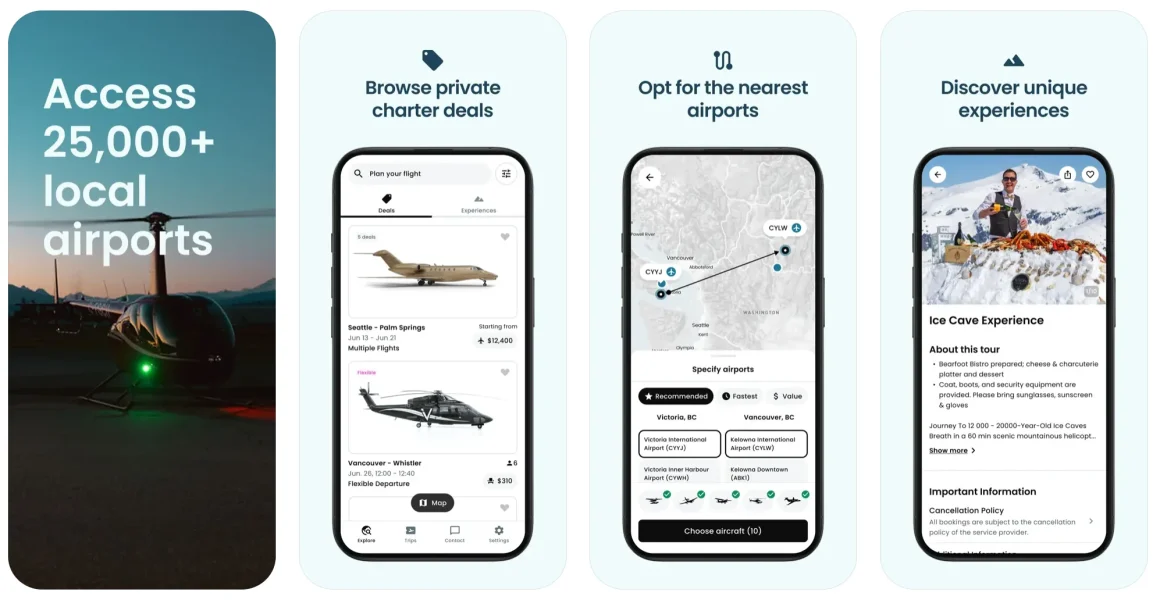
Perhaps most cleverly, Airble has turned the industry’s inefficiency into customer value through their “Empty Leg Deals” feature. These discounted one-way flights, aircraft returning to base or repositioning for another customer, have always existed but were largely inaccessible to most travelers. By making these flights easily discoverable and bookable, Airble opens up private aviation to a broader audience while helping operators fill otherwise empty seats.
The platform’s concierge services and real-time communication features complete the vision of what modern private aviation should look like: not just luxury travel, but complete control and confidence throughout the entire journey. From aircraft selection to catering preferences, Airble ensures that personalization extends to every aspect of the travel experience.
LitLife: AI Co-Pilot for Personal Trainers
LitLife is a startup that created Chiron, an AI Co-Pilot specifically built for personal trainers and gyms struggling to keep up with growing client lists. The problem is simple: as trainers get more popular, they spend less time actually training and more time doing paperwork, scheduling, and other administrative tasks. LitLife’s software handles much of that busywork automatically.
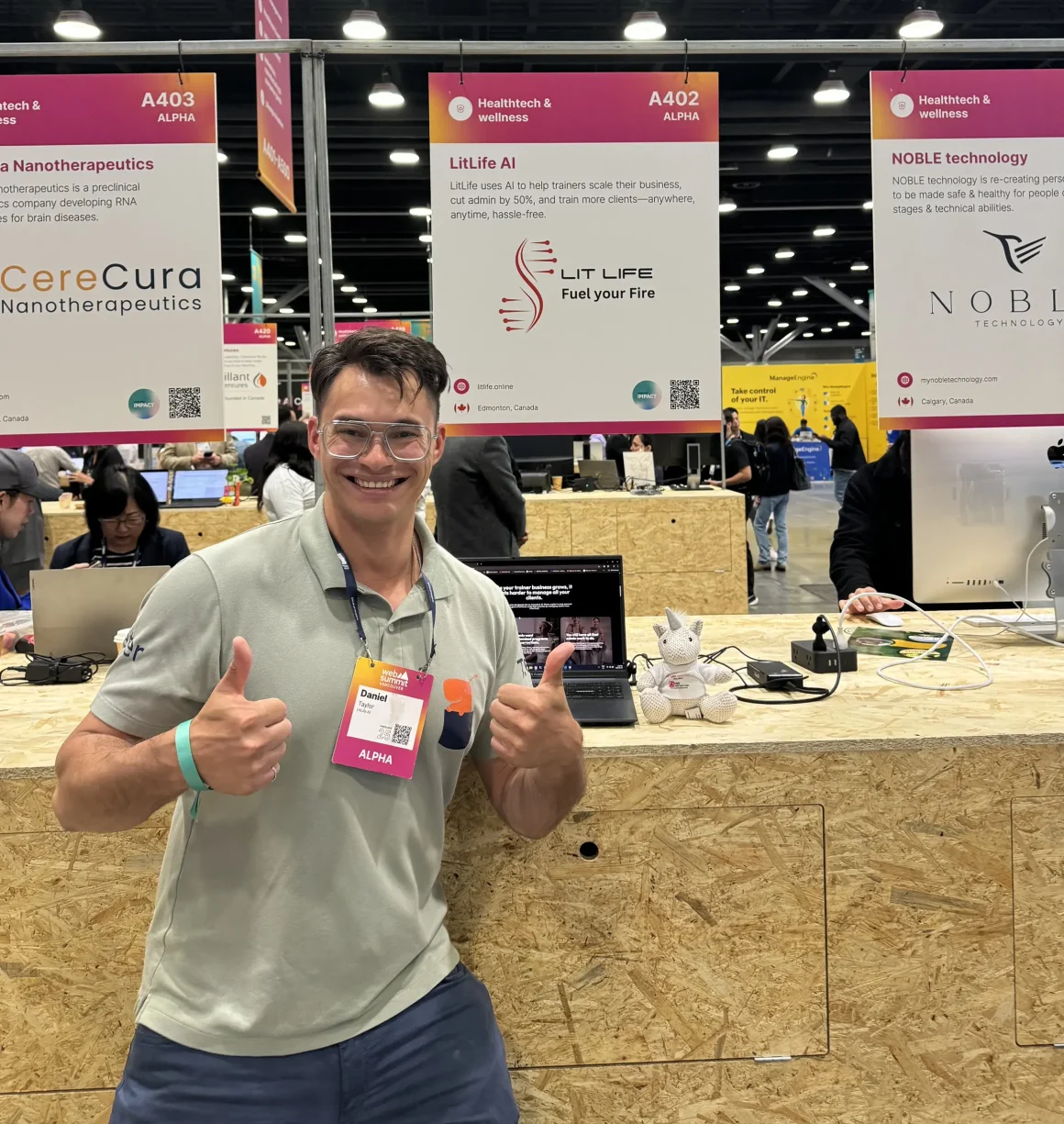
The main feature is Chiron’s ability to watch clients work out through computer vision and spot when they’re doing exercises incorrectly. It can correct their form in real-time and adjust workout plans based on how well someone is progressing. The platform also creates personalized workout and nutrition plans for each client and handles things like payment processing and new client setup without the trainer having to step in.
Instead of spending hours each week on administrative work, trainers can use LitLife to automate most of the behind-the-scenes operations. The software tracks each client’s progress, modifies their programs as needed, and keeps everything organized so trainers can focus on the actual coaching. For gym owners and independent trainers, this means they can take on more clients without burning out or losing the personal touch that clients expect.
Eagle Eyes: AI That Spots What Search Teams Miss
Eagle Eyes is a startup that builds software to help search and rescue teams find missing people faster using drones and artificial intelligence. The company’s technology tackles a fundamental problem in search operations: even with drones providing aerial views, human spotters can easily miss important details when scanning hours of footage or trying to process live video feeds. Eagle Eyes’ computer vision system automatically flags unusual colors and movements that rescue teams might otherwise overlook.

The company offers two main products that work together. Eagle Eyes Pilot is a mobile app that runs directly on drone controllers or Android devices, letting operators see potential anomalies in real-time while the drone is still flying. Eagle Eyes Scan is a desktop application that allows teams to analyze footage more thoroughly on larger screens, whether they’re reviewing recorded video after a flight or examining live feeds as they come in. Both apps can instantly share findings with the entire search team through CalTopo, a popular mapping platform used by rescue organizations.
The software works with commonly used DJI drones and can process imagery from other sources as well. Instead of relying solely on human eyes to spot a lost hiker’s bright jacket or unusual movement in dense forest, the AI flags anything that stands out from the surrounding environment. Search teams can filter these alerts by how unique the colours are or how close they are to the search area, helping them focus on the most promising leads while the drone is still in the air and can investigate further.
CircularPlace: A Platform for Professional Reuse
CircularPlace is an all-in-one platform that helps businesses make money from equipment and products they no longer need. This startup addresses a common problem: most businesses accumulate unused inventory, old equipment, and surplus materials that cost money to store but could actually generate revenue if handled properly. Their platform connects companies with buyers, charities, and other businesses that can use these items.
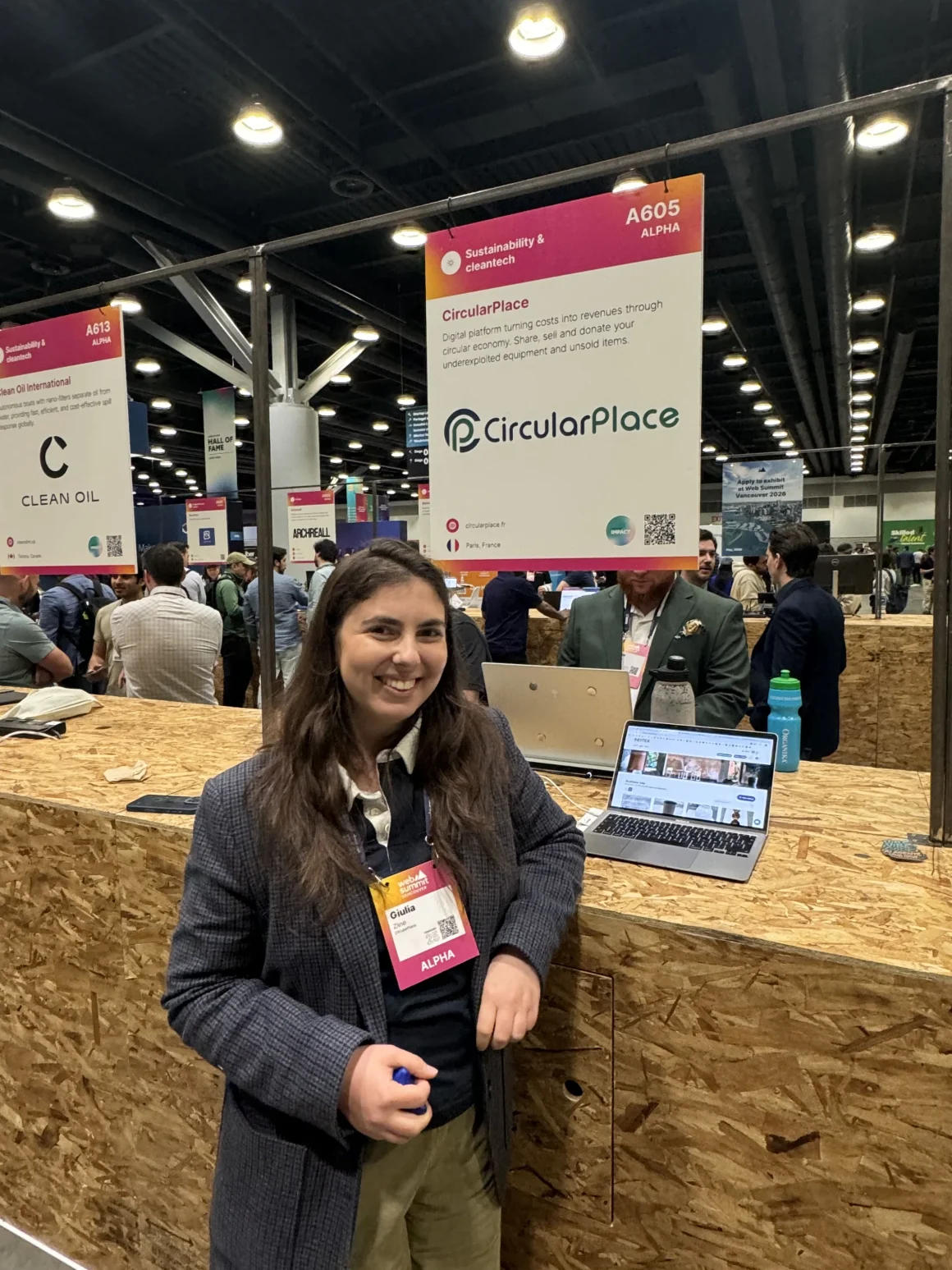
The platform offers several options depending on what businesses want to do with their surplus items. Companies can sell equipment they’re no longer using to get the best possible price, donate items to charities for tax benefits, or share resources between different locations within the same organization. The service also helps businesses manage renovations and office moves by finding new homes for furniture and equipment that would otherwise end up in landfills. Additionally, they offer a marketplace where companies can sell refurbished products to their own customers.
Instead of businesses having to figure out what to do with unused assets on their own, the platform centralizes everything in one place. Companies can reduce storage costs, generate revenue from items they thought were worthless, and even train their teams on corporate social responsibility through the platform’s educational content. The system includes over 5,000 training materials like quizzes, videos, and articles to help employees understand sustainability practices while the company turns its waste into profit.
Conscious Collective: Meaningful Corporate Gifting
Conscious Collective is a startup that helps businesses give better corporate gifts by focusing on storytelling and relationship building rather than generic branded items. The company addresses a problem many businesses face: corporate gifting often feels impersonal and wasteful, with recipients receiving items they don’t actually want or need. Instead of the typical approach of slapping a logo on random products, Conscious Collective creates gift experiences that are supposed to strengthen genuine connections between companies and their employees, clients, or partners.
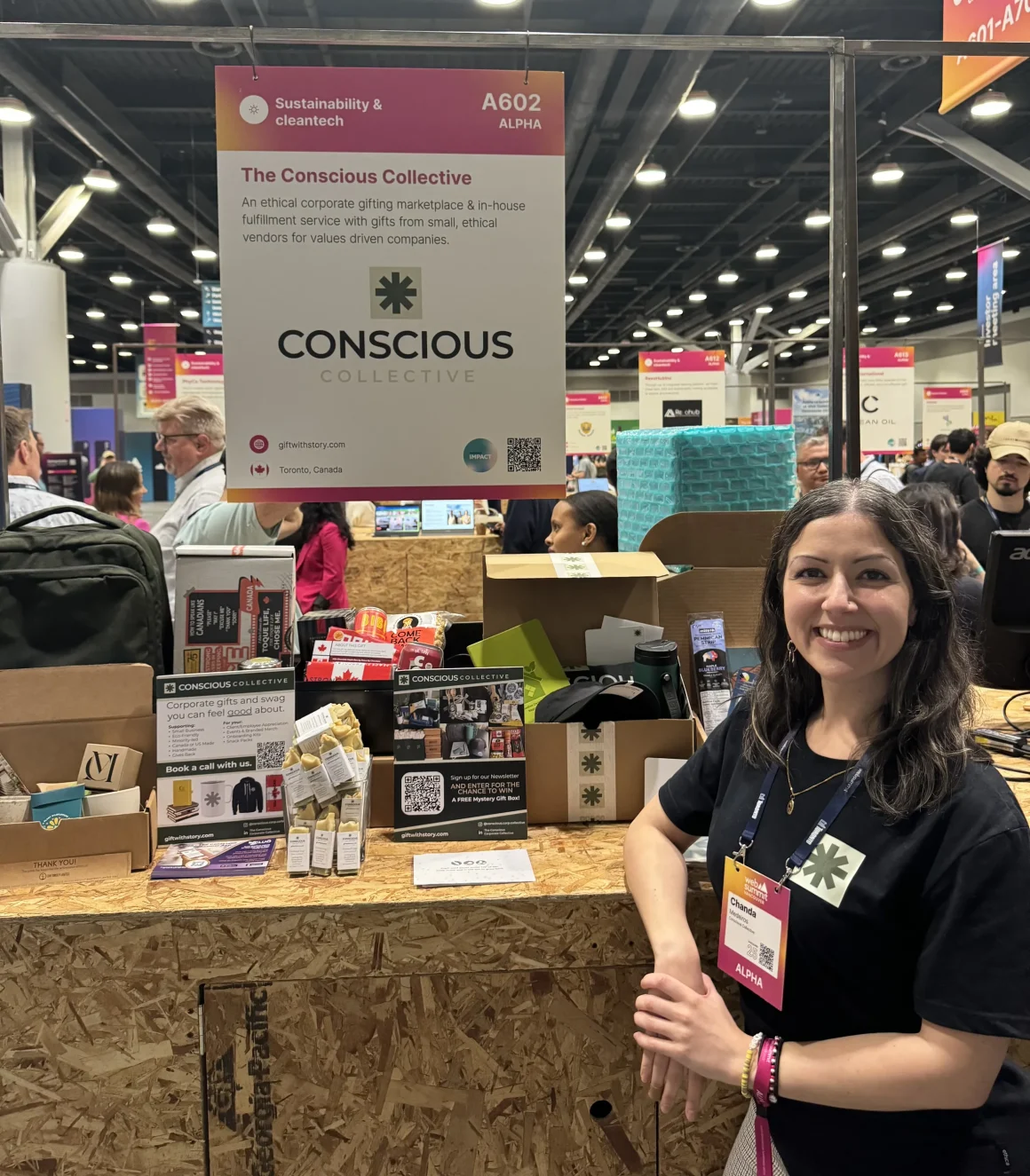
The platform offers several ways for companies to handle their gifting needs. Businesses can use the “Build-a-Box” feature to create completely custom gift boxes for specific occasions and budgets, or they can choose from pre-curated gift boxes organized by price range or event type. For companies that want to give recipients more control, Conscious Collective can set up custom online shops where employees or clients can pick their own gifts from a selection the company has approved. They also offer bulk ordering for businesses that want to buy products directly without packaging them in boxes.
The service is designed to work for various business scenarios, from welcoming new employees and showing appreciation to existing staff, to thanking clients and creating branded items for events. As a B2B marketplace, they require minimum orders of 12 units per product, but companies can mix and match different items as long as they meet that threshold. This approach lets businesses move away from one-size-fits-all corporate gifts and instead create more thoughtful experiences that actually resonate with the recipients.
Hydram Research: Turning Industrial Waste Heat Into Usable Energy
Hydram Research, a startup based in Reykjavik, Iceland, is developing industrial heat pumps that can transform waste heat into high-temperature steam that companies can actually use. The company is tackling a massive inefficiency problem: industries like data centers, chemical plants, and oil refineries generate enormous amounts of waste heat through their normal operations, but most of that energy just gets thrown away instead of being captured and reused. Hydram’s technology claims to be significantly more efficient than traditional boilers and heat pumps, potentially reducing energy costs for heavy industrial operations.

Instead of using the typical condenser-evaporator systems found in most heat pumps, Hydram’s equipment works more like a gravity-powered engine that creates steam through rapid volume expansion, then compresses it back using what they call a “liquid piston.” The technical details are complex, but the basic idea is that their system can take low-grade waste heat—like cooling water or exhaust gases—and convert it into high-temperature steam that companies can use for their manufacturing processes. Early testing suggests their approach could be much more efficient than existing heat recovery technologies.
The company has built and tested prototypes at their facility in Reykjavik, demonstrating that the process works on a meaningful scale. They’ve also filed several patents covering different configurations of their equipment. While still in early stages, their computer simulations and laboratory tests indicate the technology could work at megawatt scale, potentially transforming how energy-intensive industries like chemical production, pulp and paper, and petroleum refining handle their waste heat. For companies in these sectors, that could mean turning one of their biggest operational inefficiencies into a source of usable energy.
Produce8: Getting Your Lost Work Hours Back
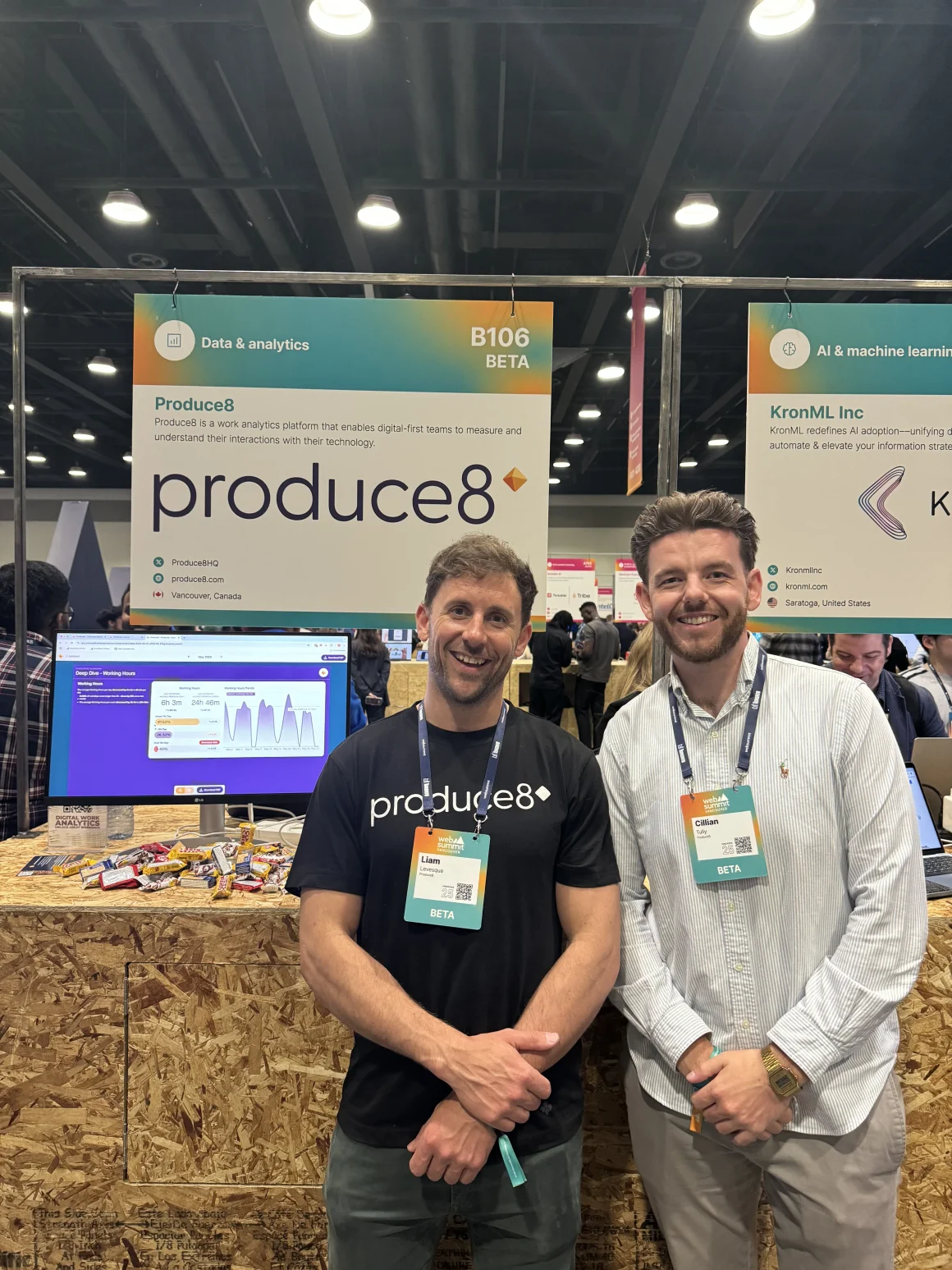
Produce8 is a work analytics platform that helps companies figure out why their employees seem busy all the time but aren’t getting much done. The startup addresses a problem most office workers know too well: people are losing about half their workday to inefficiencies like constant meetings, endless notifications, and jumping between different tasks. Instead of just telling employees to “be more productive,” Produce8 tracks how people actually spend their time and identifies the specific habits and workflows that are eating up their day.
The platform works by monitoring digital work patterns and providing personalized daily reports that show exactly where time is going. It tracks things like how much time people spend in meetings, how often they’re switching between different apps, and how various types of collaboration are affecting their focus. Teams get aggregated metrics that help managers understand broader patterns without micromanaging individual employees. The system also lets people set goals around reducing distractions and improving their work habits, then tracks progress over time.
Produce8 claims it can help organizations recover more than 90 minutes per day for each employee by making work patterns visible and actionable. The platform provides data on everything from meeting costs to team sentiment, helping companies understand not just how much time is being wasted, but what’s actually making people feel overwhelmed or unproductive. Rather than imposing top-down solutions, the system gives both individuals and teams the information they need to make better decisions about how they structure their workdays and collaborate with each other.
Goverly AI: Unlocking Government Contract
Goverly is an AI-driven platform that helps businesses get government contracts without hiring expensive consultants. The company tackles a problem that has kept small and medium businesses out of a massive market: government contracting is notoriously complex, expensive, and usually requires specialized consultants who charge high fees. Goverly automates much of this work, creating government-ready business profiles, matching companies with relevant contracts and grants, and handling compliance checks that would normally cost thousands in consultant fees.
The platform opens up the $3 trillion global government procurement market to businesses that have traditionally been shut out by the high costs and complexity. Instead of needing a team of specialists to navigate government requirements, companies can use Goverly to streamline the entire process and focus on what they do best.
What makes Goverly particularly useful for startups is its ability to track regulatory changes in real-time. Government contract requirements change frequently, and outdated compliance language can kill deals overnight. The platform automatically updates proposals when regulations shift, ensuring businesses don’t lose out on contracts because their paperwork is using last month’s rules. For companies considering government sales, this addresses one of the biggest headaches in the entire process.
CX Hero: Human-Grade Digital Avatars in 73 Languages
As you weave through the Future of Work hall, look for a kiosk where a digital concierge greets visitors in Italian one minute and Korean the next without skipping a beat. That’s CX Hero’s flagship portal. In my experience, voice-activated avatars often flirt with the uncanny valley, but CX Hero nails an equilibrium between approachability and utility. Their secret sauce connects the portal to existing CRMs and knowledge bases so the avatar can pull context-aware data, meaning it knows your loyalty tier before you even finish the sentence: “I forgot my membership number.”
The demo feels less like sci-fi and more like a sensible evolution of self-service. If you’re building anything involving AI-driven customer engagement, ask the founders how they handle data privacy in multilingual setups – their engineering team is open and detailed when talking about GDPR and PIPEDA compliance.
Homebox: Household Bill Management for People Who Despise Hold Music
One of modern life’s most tedious chores: setting up utilities when you move. Homebox shrinks that chore to a single monthly payment. This UK-based startup handles all your utility transfers, account switches, and supplier contacts, consolidating everything into one predictable bill. Instead of spending moving day on hold with multiple companies, you can focus on actually settling into your new home.
Beyond eliminating utility hassles, Homebox offers Smart Payments that let you relax with one set monthly payment. The service also provides Homebox Perks that can save you over £1,000 per year on food, shopping, eating out, electronics and more. For students and shared households, bills are automatically split equally among residents, removing arguments about who owes what.
The financial benefits extend beyond convenience. Through CanopyGrow integration, you get free access to a service that links your rent payments to your credit score, helping enhance your credit rating simply by paying your monthly Homebox bill on time. For property professionals, the service transforms void periods and tenant transitions from administrative nightmares into automated processes, presenting landlords with consolidated billing rather than scattered utility accounts to track down.
Emerging Themes You’re Likely to Notice
Looking across all these startups, a few patterns emerge that say something bigger about where technology is headed. Here’s what stands out.
AI is Moving Beyond the Buzzword Phase
Nearly every startup in this list uses AI, but what’s interesting is how specific and practical their applications have become. Instead of generic “AI-powered” solutions, we’re seeing companies like Eagle Eyes using computer vision to spot missing hikers, ComplyPilot automatically reviewing social media posts for regulatory violations, and LitLife correcting workout form in real-time. The AI isn’t the product—it’s the engine that makes previously impossible services actually work.
Democratizing Previously Exclusive Markets
Several startups are taking services that used to require significant resources or expertise and making them accessible to ordinary people or smaller businesses. Goparity lets you invest in sustainability projects with just $20, Airble brings transparency to private aviation pricing, and Goverly AI opens up the $3 trillion government contracting market to small businesses. This isn’t just about lowering prices – it’s about removing the gatekeepers entirely.
The Great De-Excelification of Business
From Trustful Clinical Budgeting getting clinical trials off spreadsheets to Produce8 showing companies where their workday actually goes, there’s a clear trend toward replacing manual, error-prone processes with automated systems. These aren’t just digital versions of the same old workflows—they’re fundamentally reimagining how work gets done in industries that have been surprisingly resistant to change.
Sustainability as a Business Model, Not a Nice-to-Have
The sustainability startups here aren’t asking companies to sacrifice profits for the planet. Hydram Research turns waste heat into revenue, CircularPlace makes money from unused equipment, and Econsciousness shows other businesses how to be profitable while being green. Environmental benefits are the outcome, but financial benefits are the driver.
Physical-Digital Bridges Getting Stronger
The most compelling solutions aren’t purely digital—they’re using technology to enhance physical experiences. Curie lets you virtually handle products before buying them, 3DentAI brings dental diagnostics to your bathroom, and CX Hero creates digital avatars that feel natural to interact with. These companies understand that the future isn’t about replacing physical interactions, but making them better through technology.
What This All Means
What ties all these startups together isn’t just clever technology – it’s a fundamental shift toward making complex systems actually work for people instead of against them. Whether it’s turning waste into profit, catching problems before they become disasters, or opening up markets that used to be closed off, these companies are solving real problems that have been frustrating people for years. The technology is finally catching up to what we’ve always wanted it to do: make life easier, not more complicated.



